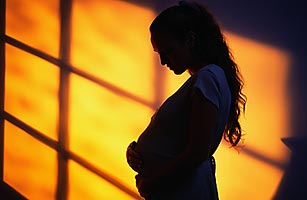
What's tougher than being a pregnant teenager? Try being a pregnant teenager in foster care. Miranda Sheffield had pinballed in and out of more than 10 foster homes in Southern California by the time she became pregnant with her daughter at the age of 17. "I was close to aging out [of the system]," she says of the program that in most states finds temporary homes for children until they are 18. "And when I got pregnant, I found there was no support for me. It was like, 'We need to get you out of foster care because we won't be able to handle you and a baby.' "
After years of steady decline, teen-pregnancy rates are rising around the country. But the numbers for girls in the foster-care system have reached truly epidemic levels. A study at the University of Chicago found that nearly half of girls who had spent time in the foster-care system had been pregnant at least once by the time they were 19 years old. Even more troubling, unplanned pregnancy had already become a pattern for many of the young women — close to one-quarter had experienced multiple pregnancies in their teens.
The stats shouldn't come as a surprise to anyone who knows the risk factors for teen pregnancy. A report released the week of July 20 by the National Campaign to Prevent Teen and Unplanned Pregnancy found that almost half of the 500,000 or so kids in foster care had sex for the first time before age 16, compared with 30% of their peers not in foster care. They're also more likely to have experienced forced sex and less likely to use contraception.
Yet very few advocates and policymakers have focused on the issue of pregnancy among foster youth. "Most people in the teen-pregnancy field don't really pay much attention to teens in foster care," explains the National Campaign's senior policy director, Andrea Kane. "And most people working in the child-welfare system are so busy trying to place kids in homes that they don't focus much on pregnancy prevention." That's starting to change. Last week, her organization announced that it is teaming up with Planned Parenthood to address the crisis in foster care — and to make sure that the White House doesn't forget about foster teens as it develops a strategy to reduce the number of abortions nationwide.
Perhaps the most important asset teenagers need to avoid early parenthood is a strong relationship with parents or other adults in their lives. But these are precisely the kinds of bonds that many foster teens lack. "You're so busy being transferred from home to home," says Alixes Rosado, who has been in foster care in Connecticut since he was 6 years old. "You don't have a lot of stable connections." The 20-year-old estimates that he has worked with a different social worker every year for the past 10. "And not a single one talked about sex."
If many social workers are disinclined to make sure their young charges are schooled in the basics of sex education, foster parents are often equally uncomfortable with the topic. Having "the talk" with their own kids is something many parents dread; discussing sex with a teenager they don't know well is even less appealing for foster parents. And the frequency with which many foster children switch homes makes it easy for some parents to assume — or hope — that someone else already covered the birds and the bees.
Effective sex ed, however, is an ongoing conversation. And that's where Planned Parenthood and the National Campaign can come in: providing professionals who can train social workers and foster parents in age-appropriate ways to discuss sex with younger children and teenagers. "Foster parents already go through trainings. The delivery system exists," says Kane. "And we have people who can teach them how to do this. We just need to put the two together."
Meanwhile, Planned Parenthood is recruiting and training thousands of peer educators — many of them in foster care themselves — who can reach out to teens with medically accurate advice. The organization is also testing out an online chat service that enables teens to get answers from a health professional at any time, day or night. "Sometimes," says Cecile Richards, president of Planned Parenthood, "we find teens are more comfortable asking a total stranger."
While unplanned pregnancy is a concern for many girls within the foster-care system, intended pregnancies are part of the story as well. "For some foster youth," says University of Chicago researcher Amy Dworsky, "having a child is a way to create a family that they don't have, or to fill an emotional void." Sheffield confirms that observation. "Sex education is awesome," she says. "But that's not always the issue. You don't really have an identity in foster care because you move around so much. And if you're not sure of who you are, you don't make good decisions."
Now the mother of a 4-year-old girl, Sheffield has found an identity for her life after foster care. She is spending the summer interning on Capitol Hill and advocating for other foster kids. It turns out there is life after foster care.
